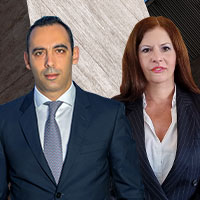
The law on the division of assets and how the Cyprus Courts will rely on it.
The law concerning the division of matrimonial assets in the case of marriage dissolution in Cyprus is neither clear nor easy to resolve. It can therefore, be seen as complex and wide. The main reason for such complexity is that every case will be decided on its own specific facts which will vary significantly from the other. The Family Court judges should apply the principles of discretion in order to achieve fairness in every case.
Fairness is the key word when it comes to the division of marital assets. The purpose is to divide the family assets fairly and not equally. This denotes that both partners must leave the court room on an equal footing and that there should be no unfair treatment with respect to each spouse’s individual role in the household. Equality in divorce proceedings is an intricate and non-ending chapter in family law which will not be examined in the current article. However, it is important to underline at this stage that matrimonial assets are not simply divided 50:50 when a couple separates, unless such split is deemed fair by the court.
Sometimes, to achieve a fair outcome the division percentage will defer from the simple 50:50 equality split. Nevertheless, the starting point in every case is that the principle of equality will be departed from only in cases where there is fair reason to do so. Usually a fair reason to depart from a 50:50 split is where the residence of a child will be divided between the two spouses. The Cyprus courts will be very careful in dividing assets where the welfare of a child is involved and will be unwilling to risk putting a child into worse living conditions after its parent’s separation.
What factors will the Family Court take into account in order to come to a fair conclusion for the division of matrimonial assets?
Division of Assets in Cyprus is governed by the Regulating Property Relations of Spouses Law of 1991 (Law No 232/1991).
The starting point here is that the judges, in examining what is the split percentage for the divorced couple, will take into account the following non-exhaustive list of factors:
- The specific type of the assets;
- The reasons under the asset obtainment;
- The time each of the assets were obtained (it plays a vital role whether the assets were obtained before or after marriage or even after the couple have lived separately but were not legally separated). Particularly, the exact time of the assets’ acquirement and under which circumstances they were acquired, is considered vital information;
- The amount of contribution to these assets by each party and of course the name who’s those assets are registered or held on.
In many cases, it will be extremely challenging for the court to determine those factors and even more challenging to consider them due to the different interests involved and sometimes the difficulty in establishing the real facts taking into account the evidence provided by each party.
It is worth highlighting here that, family law in Cyprus provides the security for married couples that matrimonial proceedings do not affect/influence the property independence of each party. Each spouse will preserve their own property and therefore, neither party will be deprived of at least the smallest percentage of their personal assets even after the marriage and divorce.
Nevertheless, section 14(1) of the Law provides that, if the property of one of the partners has been increased during the marriage, then the other partner is entitled to and may claim the percentage of their own contribution.
Usually, the one party’s contribution to the increase of the other party’s property is presumed to be one third unless less or more contribution can be established. This is where the proceedings become challenging and difficulties to resolve asset disputes are raised.
Importantly, the increase in any of the partners’ property assets do not include property that they acquired by way of gift, inheritance, bequests or donations.
The courts have accepted that contribution may not always be of monetary nature. For instance, sometimes, wives through the effort and labour they put in the family or the family house and their care, love and affection provided to the family is essentially considered as a form of contribution in the increase of their partner’s assets. Nevertheless, in order for a spouse to be successful in such a claim, of non-monetary contribution in the increase of the other spouse’s assets, they shall be able to provide clear evidence of their effort. Such evidence may include proof of excessive hours of the wife staying in the family home to take care of the housekeeping and cook all of the meals for the family or proof of staying at home to take care and look after the children. Additionally, a party may find themselves successful in establishing to the court that they have provided emotional support to minimise the emotional trauma and stress to their partner. Proving such type of contribution to the court will be challenging and difficult for the spouse in question.
In other words, if the non-financial contribution of the “housekeeper” spouse enabled the ‘wage-earner’ to earn money and win their bread, there should be no ruling which will put the housekeeper in an unfavourable position.
There is no evidence that physical support to the other party may constitute contribution for the purposes of the law, but it is not extreme to say that in the future, courts may be willing to accept such arguments. For example, a woman who provides assistance to her spouse with a disability, in order to carry out everyday activities associated with independent living and/or be able to work, should be able to have access to a percentage of her partner’s property assets.
The information provided by A.G. Paphitis & Co. LLC is for general informational purposes only and should not be construed as professional or formal legal advice. You should not act or refrain from acting based on any information provided above without obtaining legal or other professional advice.
Should you have any questions please contact us.













